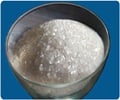Combination of fructose and glucose found in high fructose corn syrup appears to be worse than fructose alone for some heart disease risk factors.

‘Consuming high fructose corn syrup appears to be as bad as consuming sugar in the form of fructose alone due to an interaction of fructose and glucose in high fructose corn syrup.’





Research has revealed that fructose when compared to glucose has increased risk factors for heart diseases and diabetes. This leads to an assumption that the glucose in the high fructose corn syrup is anodyne.A new study, published in Metabolism Journal, tested this assumption by inspecting differences in health risk factors based on sugar type.
Study participants consumed beverages containing fructose, glucose, high fructose corn syrup or an aspartame control and researchers examined their blood for known risk factors for heart disease and diabetes.
The researchers expected risk factors to be high for fructose and low for glucose, with high fructose corn syrup being moderate.
The researchers found that risk factors were highest for high fructose corn syrup due to an interaction of fructose and glucose.
Advertisement
"Our study shows that nutrition is more than looking at individual food components. To understand the way our food affects our bodies, we need to study diets as a whole," said first author Bettina Hieronimus with the Department of Child Nutrition at the Max-Rubner Institut in Karlsruhe, Germany.
Advertisement
Source-Medindia












